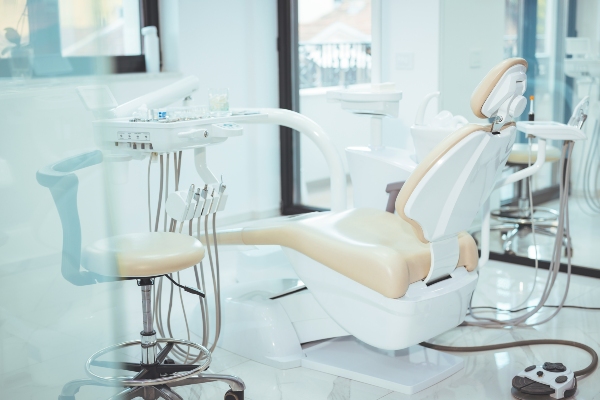When Should You See a Dentist for Treating Bad Breath?

It is perfectly normal to have bad breath once in a while or in the mornings, but an offensive odor that lingers all day is not typical. Formally known as Halitosis, bad breath can be caused by a myriad of things, from the foods you eat to underlying medical issues.
For most people, bad breath is caused by poor oral hygiene. As a result, these people have abnormally high concentrations of bacteria in their mouths, and these microorganisms produce volatile sulfur gases that smell like rotten eggs.
Bad breath can significantly impact how those around you perceive you. We all tend to avoid people with bad breath so that we do not have to endure the offensive smells coming out of their mouths. That is hardwired into the human psyche since avoiding sulfur gases helps to keep us alive. However, they smell offensive for a reason. Your body is trying to tell you to get away from whatever is causing the smell.
Getting treatment for bad breath
Anyone who notices that their breath usually or consistently smells bad should take steps to improve their oral hygiene immediately. Simple things like brushing after meals or at least twice a day can help to lower the bacterial population in the mouth and starve them of the things they need to make smelly gas. Flossing once a day is just as important since Halitosis is sometimes caused by decaying food particles stuck between teeth.
Common causes of bad breath
Sources of bacteria build-up in the mouth are most often a result of:
- Certain foods
- Dry mouth
- Health conditions, such as a respiratory infection, diabetes, gastrointestinal disorder, or liver or kidney disorder
- Improper denture cleaning
- Periodontal disease
- Poor oral health care
- Tobacco products
- Uncleaned bacteria on the tongue
The oral-systemic health connection posits that the mouth is the gateway to the rest of the body. Therefore, bacteria and infection in the mouth can lead to general health conditions and vice versa. When looking for a cause of Halitosis, we look at any contributing factors associated with the condition.
If improvements to oral hygiene do not solve the problem, it is time to consult with a dentist. The dentist can make a diagnosis that pinpoints the cause of the person’s issues. Common issues that can cause Halitosis include:
- Gum disease: Gum disease is one of the most common reasons people seek dental treatment, and it leads to a bad taste in the mouth and bad breath when it reaches its advanced stages. Known as periodontitis, the advanced stage of gum disease is a serious dental issue that has been linked with chronic health problems like diabetes and heart disease. A dentist can help to address this by performing treatments that address the patient’s gum disease, such as deep cleanings.
- Health issues: Bad breath has also been linked to serious health issues such as diabetes, liver disease, and bronchitis. Some people head to the dentist complaining about how their breath smells, only to find out they have bigger problems than Halitosis. Health issues like diabetes are much easier to treat and manage when detected early.
- Poor lifestyle choices: A person’s lifestyle choices also affect how their breath smells. For example, people who smoke are more likely to have bad breath. The same goes for people with dry mouths that are not properly hydrated. Getting treatment for Halitosis often helps to detect such poor lifestyle choices for proper treatment.
Risk factors of Halitosis
Halitosis does not generally result suddenly or on its own. Some patients may be more at risk of developing Halitosis than others, such as those who smoke, those with poor oral hygiene habits, those with dry mouth, and those with certain medical conditions, as stated above. Pregnancy can also contribute to the risk of Halitosis because of nausea, morning sickness, and hormonal changes that commonly occur.
To prevent Halitosis, especially for patients at a higher risk, it is important to follow stricter oral health care and visit a dentist more often. Keep hydrated to prevent dry mouth, brush your teeth at least twice daily in the morning and before bed, and reduce or quit smoking. We recommend patients brush the entirety of their mouth to remove all traces of bacteria; this includes the teeth, gums, inner cheeks, roof of the mouth, and tongue. Rinse with warm water and salt or mouthwash regularly, especially after odor-causing foods and beverages.
Get fresher breath
Our dentist can diagnose the cause of your bad breath and perform appropriate treatment. The sooner you are diagnosed and treated, the faster your symptoms will improve. Any early diagnosis can also help prevent further oral and general health complications. Give us a call or visit our Columbia clinic to learn more or set up an appointment with our dentist.
Request an appointment here: https://davisanddingle.com or call Davis & Dingle Family Dentistry at (803) 567-1804 for an appointment in our Columbia office.
Check out what others are saying about our dental services on Yelp: General Dentist in Columbia, SC.
Recent Posts
Halitosis treatment targets root causes, like gum disease or decay, to provide a path to fresher breath and a healthier smile. This approach addresses persistent bad breath at its source rather than simply masking odors. With the right treatment from a general dentist, patients can achieve lasting fresh breath and improved confidence in their daily…
Even if we do not like it, there is a reason our general dentist recommends routine visits at least every six months. In fact, there are several important reasons why we should get into the habit of going to the dentist for regular visits as often as is necessary or as is told. The visits…
Bad breath can feel uncomfortable and embarrassing, even more so when it does not seem to go away. If you are struggling with chronic bad breath, a general dentist can help. Many treatment options are available, some of which take place at home. In this article, we will explore the common causes of bad breath…
Maintaining good oral health is essential to a healthy lifestyle. Regular visits to a general dentist are crucial in preventing and treating different dental issues. General dentists provide a wide range of services, such as preventive care, restorative treatments, and oral health education. However, if you are new to an area or are changing dentists,…


